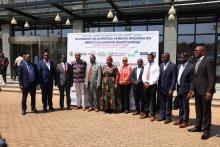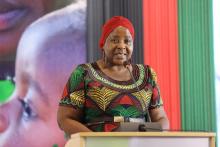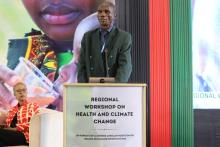Africa seeks Climate Justice for Health
Lilongwe- A Regional Summit on Health and Climate Change for the African Region is taking place at BICC in Lilongwe in pursuit of a unified African position on health in climate change negotiations. The summit has brought together delegates from African states and various development partners, state and non-state actors (AFIDEP, Amref Health, Paladium, PACJA and the African Group of Negotiators), research institutions and UN agencies.
The main objective of the meeting is to identify common agenda and position for Africa for sustained inclusion of health in the climate change narrative. Realizing how climate change affects the health sector, there has been a call for climate justice among the stakeholders.
The group of African negotiators on climate change are exploring investments in responsiveness and building resilience for better management of the direct and indirect impact of climate change on health. Appreciating the consequences of the lack of investments in health issues as an impact of climate change and how that resonates with the African continent.
Speaking at the opening of the summit, Minister of Health, Honorable Khumbize Kandodo Chiponda, MP stated there is need to recognize the intersectionality of issues arising from the effects of climate change which does not leave out the health sector. She emphasized on the need for member states to build strong collaborated efforts and create strong actions as the effects of climate change are interlinked in all sectors- women’s rights, education, agriculture, finance. Hence the need for all sectors, CSO’s, development partners, communities and umbrella bodies in Africa to build a strong united voice as Africa’s position. She also stressed on the importance of amplifying the youth’s voices for sustainability of a better planet.
On behalf of World Health Organization (WHO) representative, Ishmael Nyasulu stated that climate change is the single biggest health threat facing humanity today as it threatens the essential ingredients of good health and has the potential to undermine decades of progress in global health.
“Having responded to multiple climate change health related events, WHO is aware that without assistance to prepare and respond, weak health systems as is the case in most in developing countries will be the least able to cope with effects of climate change on health,” Nyasulu said.
He highlighted that WHO’s intention is to build on its strong involvement in climate and health globally. Committing to supporting countries in implementing their pledges under the Alliance for Transformative Action on Climate and Health (ATACH). Uniting forces and mobilizing health arguments and evidence to promote the inclusion of health content into negotiations directly through climate diplomacy channels to transform the climate narrative and contribute to ensuring a healthy, sustainable future for all.
In his remarks, AFIDEP’s Executive Director Dr Eliya Zulu underscored the significance of tax justice specific for financing health research, innovation and integrated approaches that would inform a nexus programming to the effects of climate change. He stated that it is time Africa set its priorities and drove formal and informal discussions critical at this time when the continent has been hit hard by climate change as evidenced by the Cyclone Freddy and other incidents in Malawi and other African countries.
He reinforced the importance of building political momentum on the global climate change diplomacy and the UNFCCC negotiations to build evidence and arguments that will support Africa’s motion and agenda to reshape health preparedness and responsiveness to climate change effects.
Communications Officer
WHO Malawi
email: mukhunav [at] who.int (mukhunav[at]who[dot]int)
Tel: +265 999 375 094


